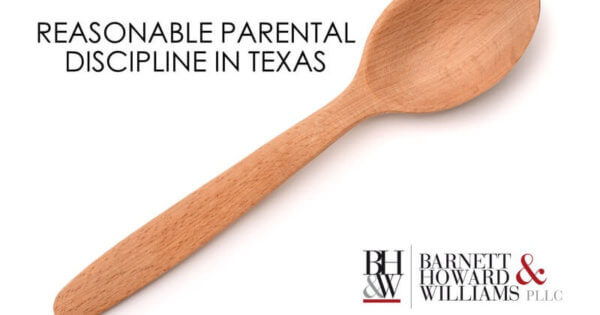
Can a Parent Spank a Child in Texas? Corporal Punishment and The Reasonable Discipline Defense
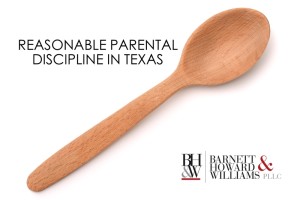 Is Spanking illegal in Texas? No, spanking is not illegal in Texas under most circumstances. The Texas Penal Code provides a defense for parents charged with Injury to a Child under Section 22.04 when the force was used to “reasonably discipline the child.”
Is Spanking illegal in Texas? No, spanking is not illegal in Texas under most circumstances. The Texas Penal Code provides a defense for parents charged with Injury to a Child under Section 22.04 when the force was used to “reasonably discipline the child.”
Specifically, Section 9.61 provides that a parent’s use of force, but not deadly force, against a child will be justified if the parent “reasonably believes the force is necessary to discipline the child or to safeguard or promote his welfare.” A reasonable belief is what an ordinary and prudent man would believe in the same or similar circumstances as the actor. It is not based on the particular belief of that parent. This is important to understand, because a parent could use force that they feel is the appropriate discipline for their child in that situation, when in fact that force could easily be an act of abuse that results in facing charges of a third degree felony.
When Does Spanking and Corporal Punishment Cross the Line and Become a Criminal Offense? When is Spanking Illegal in Texas?
In Texas, it is a known practice for parents to spank their children and it is perfectly legal to do so, but the main question is when does spanking or other corporal punishment cross the line to child abuse. When is spanking illegal in Texas? The Texas Penal Code states that child abuse occurs when the force results in bodily injury. Bodily injury means “physical pain, illness, or any impairment of physical condition.” Tex. Penal Code §1.07(8). Often, this is when use of force leaves some sort of mark, like a bruise or a cut. However, this determination will be decided on a case-by-case basis. After all, kids bruise easily and often engage in self-destructive behavior while they are being spanked (I know I did when I was a kid).
As a parent that chooses to use corporal punishment, it is to your benefit to understand that, while you have every right to do so in Texas, there are limits. The Texas Attorney General website lays out some situations where discipline will likely be considered “abusive:”
- When striking a child above their waist
- When using ropes, wires, shoes, sticks, yardsticks, phone cords, and boards during corporal punishment
- When force causes a “bruise, welt, swelling, or requires medication” it is likely to be deemed abusive
Additionally, the AG describes that the least likely abusive force is spanking with just an open hand (even though most parents that use corporal punishment are taught not to do that as a matter of principle).
If You Choose to Use Spanking or Corporal Punishment to Discipline Your Children, Be Careful.
Bottom line: Yes, parents may spank their kids in Texas. It is legal to use corporal punishment in Texas, but proceed at your own risk of crossing the line to abuse if you leave any type of mark. This rule of thumb will likely allow you to avoid situations like that of Adrian Peterson, a Vikings football player that was indicted in 2014 for injury to a child in Texas for using a branch from a tree to discipline his young son. This is a perfect example to show that while this was a perfectly accepted form of discipline in Texas at one time, it is now unacceptable.
As a parent in Texas this gives you a lot to think about and consider when deciding how to practice your right of discipline. This is just a rough overview of the bounds of reasonable discipline and should you have any questions contact our office. Additionally, if you are a parent and happen to find yourself in a situation where you are being investigated or facing charges for injury to a child, contact our criminal defense team to discuss whether the defense of reasonable discipline fits in your case.
NOTE: The “reasonable discipline” justification also applies to grandparents, guardians, someone working under the court, and someone whom has consent from the parent.
Injury to a Child Defense Attorneys – Fort Worth, Texas
If you are under investigation or have been charged with Injury to a Child for an incident related to the reasonable discipline of your child, contact our attorneys immediately. We will aggressively defend your parental rights in court, in front of a grand jury, or against police investigation. Our firm offers free consultations for all criminal cases. Contact us today at (817) 993-9249.

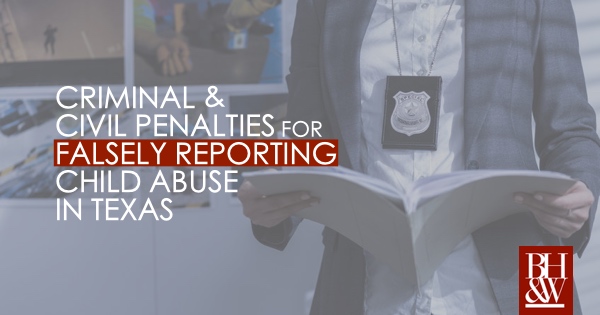
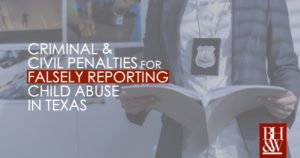 Under
Under 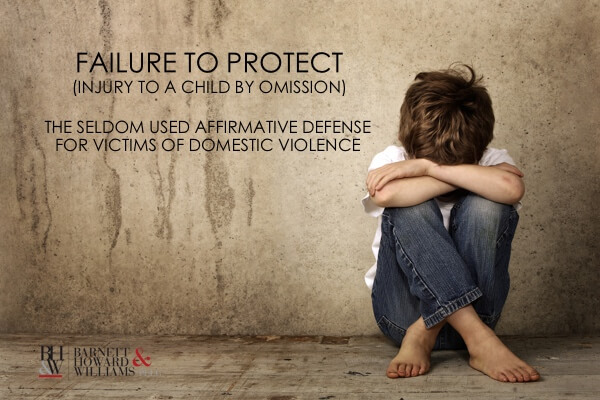
 In Texas, our “failure to protect” statute is an omission statute—Injury to a Child by Omission—meaning it aims to encourage parents to remove their children from dangerous and violent environments. If a parent “fails to protect” their child from certain known dangers, that parent can be charged with Injury to a Child by Omission, a felony level offense in Texas. The statute also covers injury to an elderly or disabled individual. If the person charged with Injury to a Child by Omission is a domestic violence victim, it is important to be aware of the Affirmative Defense Texas provides.
In Texas, our “failure to protect” statute is an omission statute—Injury to a Child by Omission—meaning it aims to encourage parents to remove their children from dangerous and violent environments. If a parent “fails to protect” their child from certain known dangers, that parent can be charged with Injury to a Child by Omission, a felony level offense in Texas. The statute also covers injury to an elderly or disabled individual. If the person charged with Injury to a Child by Omission is a domestic violence victim, it is important to be aware of the Affirmative Defense Texas provides.
 We’ve all seen those yellow “Baby on Board” signs proudly displayed by new parents on the back windows of cars. In a perfect world, drivers would slow down and car accidents involving children would never be an issue. But we don’t live in a perfect world. The Insurance Institute for Highway Safety (“IIHS”) reports that car accidents cause
We’ve all seen those yellow “Baby on Board” signs proudly displayed by new parents on the back windows of cars. In a perfect world, drivers would slow down and car accidents involving children would never be an issue. But we don’t live in a perfect world. The Insurance Institute for Highway Safety (“IIHS”) reports that car accidents cause 





